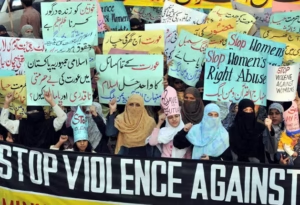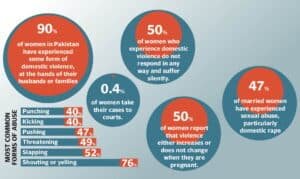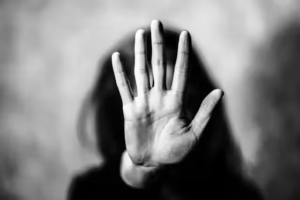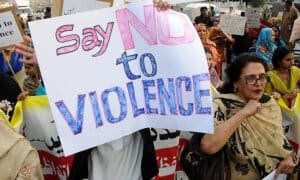
Ranked 148th out of 148 countries on the Global Gender Gap Report 2025, Pakistan has been declared the world’s worst place to be a woman this year. The country rich in culture and diverse tradition is home to a disturbing reality, being unable to provide the basic right of safety to its women, who make up nearly 49.33% of the country’s total population. The horrendous number of cases of domestic violence, rape, harrasment, honorkilling and acidattacks, are nothing less than horrific and hopefully eye-opening for the state. From Zainab to Noor Mukadam, from Sana Yousaf to Qandeel Baloch, from Khadijah Siddiqui to Samiya Hijab, these cases have just highlighted the uphill condition of women in Pakistan and the helplessness of the state.

Facts and figures:
Women in Pakistan face significant challenges that include gender inequality, domestic violence, limited access to healthcare and education, patriarchal norms etc. In the year 2024 alone, a total of 32,617 cases of gender based violence were reported nationwide that included 5339 rape cases, 24,439 kidnapping and abduction cases, 2238 incidents of domestic violence and 547 cases of honor killing. With Punjab recording the highest figures of all provinces, 26,753. Not to forget that hundreds of cases still go unreported either because of socioculture barriers, economic dependency, lack of information etc. According to the Pakistan Demographic and Health Survey 2017-2018, 56% of women who have experienced any type of physical or sexual violence, have not sought help or talked to anyone about the violence. These figures show how this problem is not related to one woman, one city or one province and has grown to become a national crisis demanding immediate government attention.

Government response
During the 78 years of its existence, no government has taken this problem seriously and even if they did, the legal framework around it was very weak. It’s not as if laws weren’t formed to ensure women protection, but no strict action upon them, resulted in loopholes in provision of justice to victims. The Protection Against Harassment of Women at the Workplace Act 2010 and the Domestic Violence Prevention and Protection Bill 2012 were strong and crucial steps for women protection but unfortunately, implementation and enforcement remained significant challenges. The limited availability of comprehensive data, also hinders effective policy making and monitoring of progress.
Causes
There are many reasons behind these heinous crimes against women that include the mentality of our society, the different upbringing of girls and boys from a young age, lack of education, the failure of implementation of laws and others that are:
- Patriarchal society:
Pakistan’s patriarchal society not only practices different mindset and upbringing between young girls and boys but has also normalized gender based violence by either justifying these acts or ignoring them completely.
- Lack of education:
The lack of education and the awareness about women rights is one of the key factors contributing to gender based violence in the country.
- Failure of implementation:
Where many laws have been introduced to safeguard the rights of women in the country, the failure to implement them has remained one of the primary issues in this regard. Perpetrators often escape punishment, undermining the justice system.
- Cultural and social reforms:
The harmful cultural and social norms often perpetuate violence against women. Men are treated and made to believe that they are superior to women and that they are born to control women.
- Threatened masculinity:
Economic dependency, unemployment or educational inferiority compared to women, is considered as shameful or a threat to masculinity by some men.
- Honor culture:
In Pakistan, honor of a family is only tied to the women and not the men, leading to honor based killings in large numbers.

Call to action:
By working together and taking specific initiatives against such heinous crimes, we can create a safe and sound society for women in Pakistan.
- Women protection centers:
The government needs to step up and open protection centers for women throughout the country. So those who have been subjected to any form of violence, have been harassed or abused, are single mothers or divorced, may live freely, get therapy, learn some skills, be financially independent and live life in a safe and sound environment.
- Helpline numbers:
Helpline numbers should be launched nationwide so any woman in need of help may receive it instantly.
- Raising awareness:
Government should mobilize youth, media, welfare organization and institutes and arrange seminars, conferences, campaigns and workshops using various forms of media to raise awareness about women rights and gender studies, and make them a compulsory part of curriculum.
- Legal reforms:
Not just strict law making but strong implementation needs to be ensured so that the current loopholes in law making, that are one of the biggest barriers in provision of justice for victims, can be solved.
- Empower women:
Supporting female education, financial independence, empowering them, is the need of the hour. This also includes providing support and resources to survivors of violence.
Welfare organizations and some positive work:
Where we talk about legal loopholes and government’s disinterest in tackling such cases, we must acknowledge our welfare organizations and NGO’s who work for women protection and provide every kind of support to women who have been victims of domestic violence, rape, abuse, harassment or any other kind of violence. These include:
- Bedari
- White Ribbon Campaign Pakistan
- Lawyers for Human Rights and Legal Aid LHRLA
- Madadgar National Helpline 1098
- War Against Rape Pakistan
- Acid Survivors Foundation Pakistan
- Chayn

Conclusion:
Overall, where some small steps and initiatives have been taken by governments all these years, more needs to be done and strictly implemented. Not just legislative reforms but changing the mindset of the society is very important, that is to eliminate deeply ingrained societal attitudes and considering them as minor or weak. Every single woman has the right to feel safe enough to walk on streets without being accompanied by a man, irrespective of the time of the day or the clothes she wears and get the same opportunities that men enjoy.

